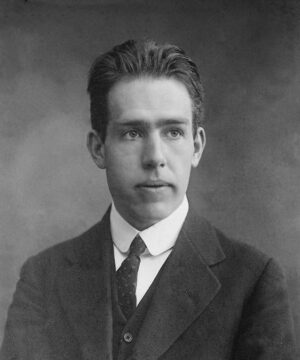
Niels Bohr (1885–1962): Niels Bohr was a Danish physicist who made significant contributions to the understanding of atomic structure and the early development of quantum mechanics. Born in the late 19th century, Bohr introduced the concept that an atom is a small, positively charged nucleus surrounded by orbiting electrons that exist in discrete energy levels. His innovative model of the atom known as the Bohr Model, suggest that electrons move in designated orbits around the nucleus and that the chemical properties of an element are largely determined by the number of electrons in the outer orbits. Bohr was also instrumental in developing the principle of complementarity which states that a quantum system can be understood in multiple, mutually exclusive, yet equally valid ways. Awarded the Nobel Prize in Physics in 1922 for his work on atomic structures, Bohr’s work laid a crucial foundation for modern atomic physics.